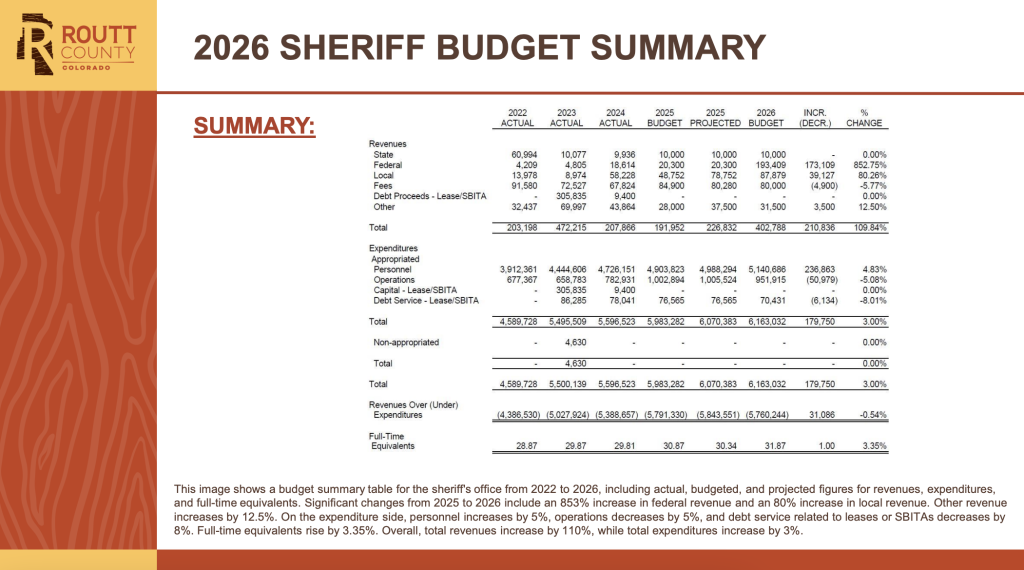Mental health grants boost expected 2026 sheriff’s office revenues
Routt County Sheriff’s Office 2026 budget projections, presented to the Routt County commissioners last month, indicate an expected 110% revenue increase, primarily due to federal grants for a new mental health co-responder program.
During an Aug. 18 commissioners’ work session, Sheriff Doug Scherar broke down the agency’s 2026 budget in a presentation, citing federal grants for the co-responder program as a major contributor to the anticipated revenue spike.
The co-responder program, which has been in the works for the last two years, pairs a sheriff’s deputy with a mental health professional who is equipped to respond to mental health emergencies.
The program “aims to stabilize individuals in crisis, divert them from unnecessary hospitalization or incarceration, and connect them with essential services,” according to a June news release from the county.
Together, the deputy, Dawn Smith, and the mental health professional employed by UCHealth are referred to as the Routt County Mental Health Response Team.

“This program is about treating individuals in crisis with dignity and ensuring they receive the right care at the right time,” said Melina Bricker, assistant Routt County manager, in the June statement. “It also helps reduce strain on our local emergency department and the judicial system.”
The federal grants — from the Behavioral Health Administration and Department of Justice — total $173,109, increasing the agency’s federal budget by 853%, according to Scherar’s presentation.
The mental health response team is now in field training but not yet working full time, Scherar said in an interview with the Steamboat Pilot & Today.
Once fully operational, the pair will work 11 a.m.-9 p.m. Tuesday through Friday, “aligning with peak times for behavioral health calls,” the news release adds.
During the August work session, Scherar told county commissioners that sheriff’s office personnel costs are anticipated to increase, primarily due to the addition of the mental health response team member.
Formerly assigned with animal control and patrolling responsibilities, Deputy Smith is now the full-time mental health response team member assigned to the co-responder program.
The sheriff’s office is now looking to fill Smith’s previous position, increasing the personnel costs. The agency’s personnel budget is expected to increase by $236,863, from just under $5 million to $5.1 million.
Scherar also noted that an agreement between the town of Oak Creek and the sheriff’s office, requiring the town to reimburse the agency for law enforcement services due to its lack of police, also contributed to the revenue increase.
Under the renewed January agreement, the town pays sheriff’s office employees a rate of $52 per hour for responding to “emergent matters.”
The town also reimburses the sheriff’s office at a rate of $93 per hour for additional off-duty deputy patrol coverage, such as at special events.
As Oak Creek continues its hunt for a full-time police chief, Scherar said the sheriff’s office will continue to send deputies to assist with law enforcement. Once a police chief is hired, sheriff’s deputies will decrease coverage.
“Any additional resources they hire down there should lessen the amount of time that deputies are spending down there,” said Scherar.
The agency’s operations budget is also expected to decrease by about 5% in 2026, mostly due to overprojections in the 2025 budget that left unused funds, particularly in the co-responder program and contributions to the intergovernmental All Crimes Enforcement Team.
Moving forward, a proposed county short-term lodging tax could contribute to the sheriff’s office funds if approved, said Routt County Commissioner Angelica Salinas during the work session.
If county voters approve the measure, the new tax would be levied on rentals of fewer than 30 consecutive days, such as hotels and motels, short-term rentals, bed-and-breakfasts, private campgrounds and RV/trailer parks not located on public lands, and timeshares, among other temporary accommodations. The proposed tax would not apply to Steamboat Springs and Hayden, which already have implemented voter-approved short-term lodging taxes.
After some of the funds are directed to tourism, 90% of the yearly funds would be directed toward community needs such as infrastructure improvements and enhancing public safety through local police, fire personnel and emergency medical services.
“Most of us are in agreement with moving forward with the lodging tax for 2025 on this year’s ballot with the uses for infrastructure, maintenance and public safety,” said Salinas during the work session. “… It’s something that we’re looking at it and we know that investment in public safety is really important and there are these added needs, increased services and the level of service we want to provide. That’s something on our priority list when we think about the lodging tax.”

Support Local Journalism

Support Local Journalism
Readers around Steamboat and Routt County make the Steamboat Pilot & Today’s work possible. Your financial contribution supports our efforts to deliver quality, locally relevant journalism.
Now more than ever, your support is critical to help us keep our community informed about the evolving coronavirus pandemic and the impact it is having locally. Every contribution, however large or small, will make a difference.
Each donation will be used exclusively for the development and creation of increased news coverage.










